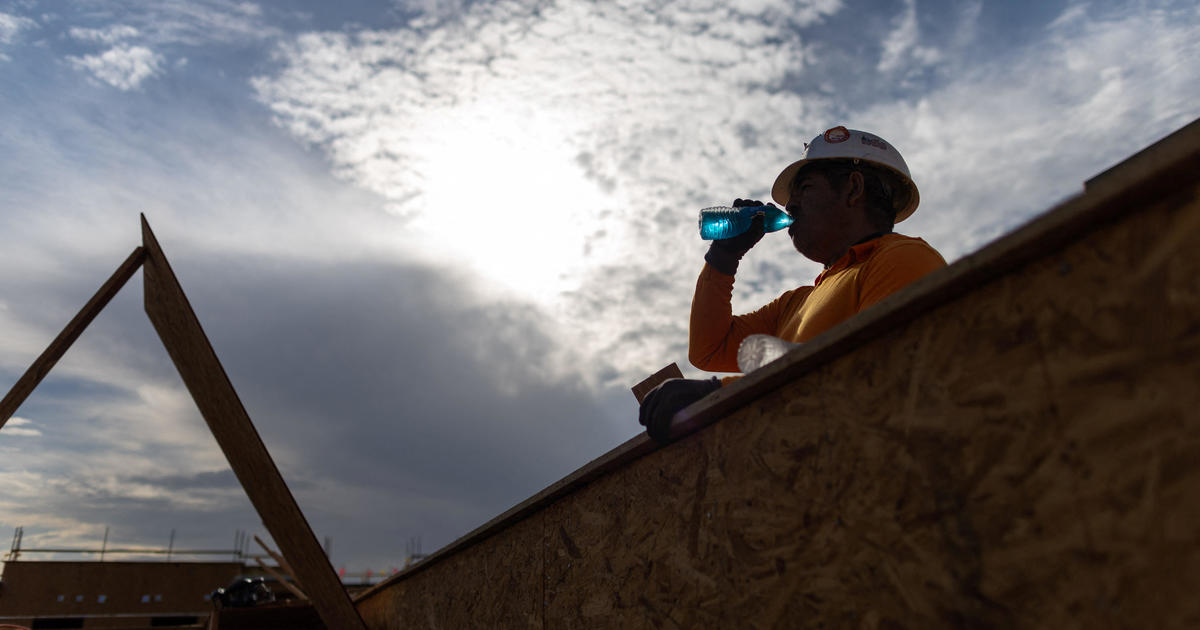Should you get a coronavirus vaccine if you're pregnant? Experts say medical trials need to change.
London — Ann Mead, who is in her second trimester of pregnancy, isn't sure if she's going to get the COVID-19 vaccine before she has delivered her baby. The teacher is one of many pregnant frontline workers who are being offered inoculations, but are uncomfortable with the lack of relevant safety trial data for pregnant people.
"I don't know that I feel like being a guinea pig for it, because it's not just my body right now," Meade said.
Women — many of whom are or may become pregnant — make up a high proportion of healthcare workers and teachers around the world. However, pregnant people are often excluded by default from vaccine studies. And this blind spot doesn't just apply to data on vaccines: Pregnant women, despite facing more severe disease if they become sick with COVID-19, have been largely excluded from coronavirus drug treatment trials as well.
"I just don't know how long it will be until I feel like I am protected," Meade says.
A history of exclusion
The coronavirus pandemic has brought fresh attention to the decadeslong debate over the ethical inclusion of pregnant women in medical trials.
In the second half of the 20th century, after medical science had used the male body as its default paradigm for hundreds of years, activists began campaigning for the greater inclusion of women's bodies in studies, and over time, they saw a significant amount of success.
"There's pretty good reason to think that women have a secure place along with men, an equal place along with men, in the way in which biomedical research is done," Ruth Faden, founder of the Berman Institute of Bioethics at Johns Hopkins University, told CBS News.
"The one group that was left behind was pregnant women," she said.
The complex ethics around pregnancy, as well as liability concerns by pharmaceutical companies and researchers, meant that it wasn't straightforward to flip a switch and start including pregnant women in studies.
Even so, Faden said, they still needed treatment if they became ill, and therefore faced an unfair lack of information about their health.
"It wasn't as if pregnant women weren't taking drugs. It wasn't like pregnant women weren't taking vaccines. What was happening is that the risk was being pushed over to the women themselves," Faden said.
"Instead of having any evidence, it moved over to: OK, clinicians are now going to have to make tough decisions. They have a patient who is pregnant, who has cancer. There's a new cancer drug. We don't know anything about this drug in pregnancy. What are we going to do?"
The debate over ethics
The coronavirus swept the globe about six months after Faden, alongside other leading experts in bioethics, vaccine research, maternal-fetal medicine, pediatrics, philosophy and public health, released a series of 22 recommendations for policymakers, drug companies and clinical investigators about how to ethically include pregnant people in vaccine trials during an epidemic.
Spurred by the 2015 fight against Zika, a virus with devastating consequences for pregnant people and their offspring, the group decided it was urgent to develop clear guidance so pregnant people could be safely and ethically included in trials, especially in the context of an outbreak.
"Widespread failure to appropriately include pregnant women in vaccine research means that evidence about safety and efficacy in pregnancy has been limited and late in coming," the guidance said.
"As a result, in numerous outbreaks and epidemics, pregnant women have been denied opportunities to receive vaccines that would have protected them and their offspring from the ravages of these diseases. This way of treating pregnant women in vaccine research and deployment is not acceptable. Business as usual can no longer continue," it said.
The recommendations include things like making sure pregnant women are given access to vaccines or vaccine studies in the context of an epidemic if the risk of the pathogen is deemed to be greater than the risk of the inoculation, "because pregnant women are the moral equals of others, and because there is nothing about being pregnant that would make them or their offspring less susceptible to the harms of emerging pathogenic threats."
They also say that preparation of everything necessary to commence clinical trials on pregnant women should be done early, so those studies can start as soon as it's appropriate.
"Our guidance and other recommendations are well known in the community of biomedical scientists and public health people. But not much has changed, actually," Faden told CBS News.
The case of COVID-19
Last month, Pfizer announced that it had begun the first large-scale trial of its vaccine on pregnant women, after its vaccine was approved for emergency use in the U.S. in December. It expects that trial to be finished by the beginning of 2023.
Moderna, whose vaccine was the second to receive emergency use authorization in the United States, has not begun trials, but has created a registry to track pregnant women who get its vaccine. Johnson & Johnson, which received emergency use authorization for its vaccine late last month, said in documents submitted to the Food and Drug Administration that it plans to include pregnant women and their infants in its studies as well as collect data on pregnant women via a registry.
Faden told CBS News that these trials are beginning later than they could have, in part because of a delay in starting the time-consuming trials on pregnant animals, which are required to be completed first.
"It should have been the case that the people developing the vaccines were ready to go with studies with pregnant women as they were developing their confidence about the safety of the vaccine. At the very least, once they got this initial approval from the regulatory authorities, they should have had that protocol on the shelf, approved by the research ethics committees and ready to go. Instead, we're seeing a lag," she said.
In a statement to CBS News, Pfizer said the company "recognises that developing a potential SARS-CoV-2 vaccine for broad use is critically important to help stop the pandemic, including for potential use in pregnant women. Pfizer is following guidance provided by the Food and Drug Administration (FDA) for development and licensure of vaccines to help prevent COVID-19, including the important consideration of use in pregnant and women of childbearing potential." Neither Moderna nor Johnson & Johnson had replied to requests for comment from CBS News at time of writing.
Despite the lack of specific data, pregnant women around the world are still permitted to get vaccinated against the coronavirus, and many doctors encourage them to do so.
"As it turns out, it looks like sizeable numbers - we don't have the exact numbers yet - of women who are pregnant, who are health workers, are choosing to be vaccinated. And information about these women is being collected by public health authorities in different countries. And we're hoping very soon to get some information about their experience," Faden said.
Dr. Anthony Fauci, the head of the U.S. National Institute of Allergy and Infectious Diseases and the chief medical advisor to the president, says there have been "no red flags" among pregnant people who have elected to get the vaccine so far.
In an interview with CBSN, Dr. Frank Chervenak, chair of Obstetrics and Gynecology at Lenox Hospital in New York City, said, "There's no evidence that this [vaccine] harms the woman and there's no evidence that it harms the fetal patient."
The risk of getting sick with COVID-19 during pregnancy, he said, is a much more serious concern: "The reality is that they are more susceptible to death, to admission to ICUs, to going into premature labor and having all sorts of complications of pregnancy."
Beyond the vaccine
When COVID-19 began to spread in 2020, Dr. Nathalie Broutet, Dr. Loulou Kobeissi, and others from the World Health Organization's Department of Sexual and Reproductive Health and Research quickly saw that the same problem of lack of research on pregnant women persisted in treatment trials, as well as vaccine trials.
"There were no pregnant women included in these (treatment) trials," Broutet said. "But also, there is no real reason why they were not included."
To illustrate their point, Broutet and Kobeissi, along with a team of other WHO scientists, made a comprehensive list of every COVID-19 drug treatment trial in 10 major databases going on during two separate periods: three days in April 2020 and five days in July 2020.
They then isolated only the trials of types of drugs that would be assumed to be fine for a woman to take if she was pregnant, like some non-biological drugs and high-dose vitamin treatments.
Of those, they found that 80% going on in April excluded pregnant women. By July 2020, they found the number of trials of COVID-19 treatments that were not contra-indicated for pregnancy had risen from 155 to 722, but 75% still specifically prevented pregnant women from participating.
An individual decision
"It is deeply unfortunate that pregnant women are still in this scenario where they can't point to the same level of evidence that people who are not pregnant can point to when they make the decision whether to be vaccinated," Faden told CBS News.
Dr. Joanna Mountfield, a vice president at the U.K.'s Royal College of Gynaecology, says women who are considering getting vaccinated can approach their doctors with specific questions to help them make their decision.
"Is there anything about me personally that means that I am higher risk compared to somebody who was fit and healthy and straightforward?" Mountfield said. "So things like, are they overweight? Have they got underlying diabetes? All the sorts of things that put you actually at higher risk within your pregnancy itself."
She then suggests that women ask their doctors about the science of the coronavirus vaccines.
"I would say, can you explain to me what the vaccine entails? It depends on the vaccine — they're different sorts of vaccines. And, why there isn't a recommendation to have it routinely. And then the doctors can help (explain) the reason why it is, about the lack of evidence rather than having major concerns about the safety."
Mead, the teacher, said she will make a personal decision with her health care provider about whether or not to get vaccinated.
"In the meantime, I think (I'll) just continue to practice everything I can to keep myself as safe as I can, wearing masks, social distancing and all that."
Meanwhile, Faden, Broutet, Kobeissi and other scientists and activists continue to push for pregnant women to be included in more vaccine and treatment trials when reasonable.
"We need data," Kobeissi told CBS News. "The need for data is very essential."



